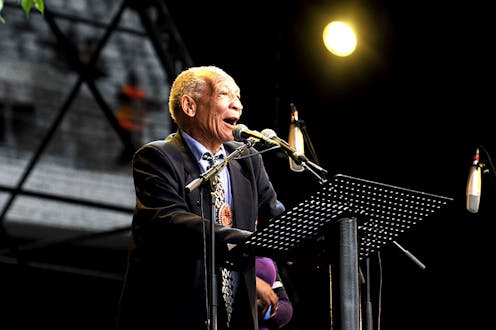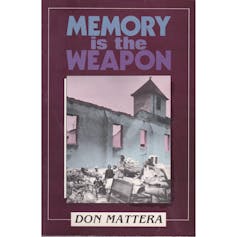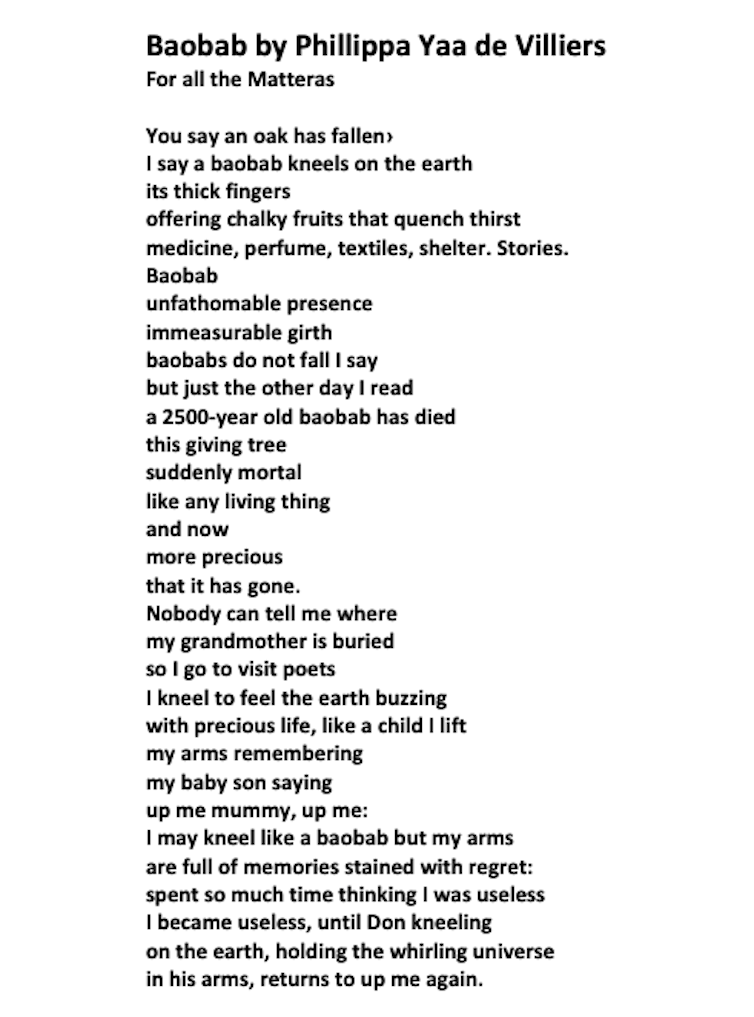
The towering South African poet, activist and humanitarian Donato Francesco Mattera passed away on 18 July at the age of 86. What he represented to South Africa is far larger than his contribution to literature.
During the online memorial service for Mattera, filmmaker and lecturer Dr Teddy Mattera said of his father: “He illuminated my pathway as a creative person.” Tributes from journalists, historians, politicians, doctors and lawyers – people who don’t readily identify as creative – echoed his sentiments. Herein lies the enduring greatness of Don Mattera: what he did for people.
He was, in the traditional sense, an African poet, the centre of social life. Although Don was entertaining, he was far more than an entertainer; as a spokesman for the poor and marginalised his reach was wider than an activist’s. He was never a public representative yet he represented people.
He was an outsider to the intellectual establishment, a passionate voice in the wilderness.
Often abrupt in his critique of elitism, and his lifelong profound identification with the poorest and most marginalised members of society, what he stands for challenges the academy’s conception of The Humanities. It urges them to do better to serve human beings. For South African universities to walk their decolonial talk, they will have to acknowledge the importance of a figure like Mattera to the society well beyond making people write exams on his scansion and prosody. They will have to perforate brick and mortar of the university with clay and thatch, and abandon, or at least question, the brittle certainties that uphold the system as it is.
Like all great poets, Don embodied paradox, and was motivated by, and motivated, radical change. From the early days of apartheid right up until his death, he challenged authority, publicly witnessed systemic violence, he actively used his agency and voice to liberate himself and others.
His style was emotional and subjective, which may also have contributed to his exclusion from the academy, where his work is not widely taught. He spoke up for and supported organisations defending prisoners, children, women, people with disabilities, the KhoeKhoe people. If the essence of excellent scholarship is rigorous research, innovation and relevance to society, Don’s only crime was passion.
Memory is the Weapon
Don’s autobiography Memory is the Weapon (1987) is a seminal reflection on apartheid’s earliest crimes, particularly for its detailed observation of ordinary life, its unflinching portrayal of violence and its much-needed humour and humanity. It is the “poet as historian” described by South African author AC Jordan.
An instance of the vividness of his language and searing compassion, reflecting the conditions that sadly continue to dehumanise and impoverish people:
You would find a man or a woman lying drunk in the slime and grime and debris, breathing the foul air of a dispossessed and forsaken life – men and women robbed of those vital fibres that separate man from beast.

Poetry brought Don and I together. We agreed that poetry, with its ability to contain and express the harshness of pain, grief, rage and despair, had drawn us in and healed us: his from the harsh deprivations of early urban apartheid and mine from the duplicity of my childhood.
Poet of compassion
“He led with his soul,” said Fasiha Hassan, scholar, activist and mentee of activist and political leader Jessie Duarte at an intimate Women of Waqf event at the Masjid-Ul-Islam in Fordsburg specifically designed for community healing following the deaths of Yasmin Jessie Duarte and Don Muhammad Omaruddin Mattera.
Spirituality and poetry are on the same frequency, and lent his words a presence and intimacy which inspired his readers to action – always positive, affirming and defending Black people, and importantly, inspiring people to raise each other. In this way we reach for and enact our highest human potential. He said to me, “When you get a chance to move up in the world, look around and see who you can take with you.”
We were in Kimberley at the Northern Cape Writers’ Festival of 2008, where he held court alongside poet Keorapetse Kgositsile, healer and author Credo Mutwa, and writers Diana Ferrus, Sindiwe Magona and James Matthews. Unique in the way it presented traditional dance and storytellers from deep in the Kalahari desert, the festival programme taught me, among other things, that there are at least three more indigenous languages that are not recognised because they’re not written down, and Don could speak them.
The Kimberley stage was broad enough to contain and cherish his unique genius, and gave him space to demonstrate his prolific response to the canon of indigenous oral poetry, and equally the lyrical in English.
Don’s relationship with mortality may have its roots in another formative experience, he confided in me when we were on tour in the UK. As a teenage gangster in Sophiatown in the 1950s, before he got involved with politics, he killed a rival gangster in self-defence. Eternally wounded by the experience, Don became the poet of compassion, of anything life-affirming.
His spirituality was also political: his Pan Africanism was non-racial and welcoming. In 2009 we joined a delegation including Kgositsile and Lebo Mashile to tour the UK. As we walked through the airport, waiters, servers, bartenders and cleaners flocked to greet the two gentlemen of letters, while white fellow travellers looked on bemusedly. I was reminded, after having experienced the same with James Matthews two years previously, that we are seen by those who are invisible. And poets are more than wordsmiths, they deliver heart and minds from emotional suffering and ignorance, and inspire agency. It is a calling, not a career.
Read more: A tribute to Keorapetse Kgositsile, South Africa's poet laureate
Mattera and his works were banned for more than ten years during apartheid. After the banning order was lifted he self-published his poetry collections, and in 2008 Rose Francis, the founder of African Perspectives Publishing, republished Memory is the Weapon and Azanian Love Song.
If a poet’s value is based on their commercial currency, many of us would not be able to claim the title. Mattera’s values, strongly influenced by his Pan Africanism, Black Consciousness and Islam, see the well-being of the individual as indivisible from that of the collective, and the humanities would do well to follow that example.
A baobab kneels
The aesthetic concerns of oral poetry do not always successfully transfer to the page; sound demands a musicality that is sometimes at odds with the content of a poem. Don Mattera’s unforgettable voice straddled traditions and united divergent and often contradictory imperatives: he was an oral poet and a writer, an Italian and an African, a nationalist and a Pan-African.
To keep his vision alive we could start by conceiving of creativity as a human potential in everyone, and prescribe his works to students of medicine, law, social work and administration, and not just teaching and literature.
In his tribute at the memorial, Teddy said that his father was an oak who left many seeds, but I disagree. He is a baobab who seeded a forest.

Phillippa Yaa de Villiers does not work for, consult, own shares in or receive funding from any company or organisation that would benefit from this article, and has disclosed no relevant affiliations beyond their academic appointment.
This article was originally published on The Conversation. Read the original article.







